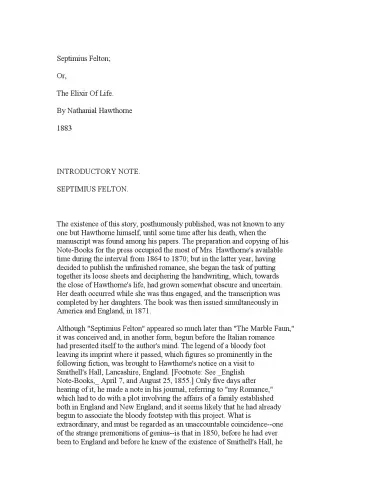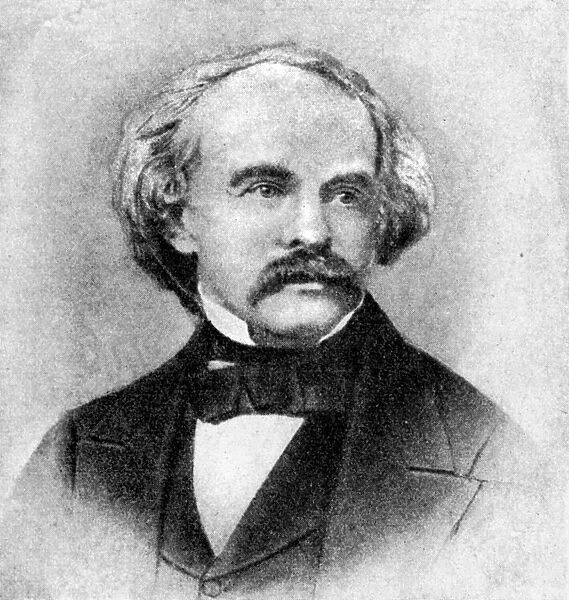Septimius Felton or, The Elixir of Life
3.6
Reviews from our users

You Can Ask your questions from this book's AI after Login
Each download or ask from book AI costs 2 points. To earn more free points, please visit the Points Guide Page and complete some valuable actions.Introduction to 'Septimius Felton, or The Elixir of Life'
'Septimius Felton, or The Elixir of Life' is a captivating narrative by Nathaniel Hawthorne that explores the profound themes of immortality, human ambition, and the moral complexities arising from the pursuit of eternal life. Set in the backdrop of the American Revolutionary period, the tale intertwines historical context with mystical elements, creating a compelling storyline that resonates with the timeless human quest for knowledge and meaning. This novel, although not as famous as Hawthorne's other works, is a masterpiece of speculative fiction that offers readers an intriguing blend of historical fiction and metaphysical inquiry.
Detailed Summary of the Book
The story begins with the protagonist, Septimius Felton, residing in a small New England town during the time of the American Revolution. He is a young scholar with an intense thirst for knowledge and understanding, particularly regarding the secret of immortality. Septimius's quest for eternal life is driven by a blend of intellectual curiosity and a fear of death. His journey is sparked by a mysterious figure, an English soldier named Maurice, whom Septimius encounters in the woods. The soldier spills what might be the secret formula for an elixir of life just before his death. This incident becomes a pivotal moment, propelling Septimius into a passionate pursuit of alchemical knowledge in an attempt to recreate the promised potion. As Septimius delves deeper into his research, the novel explores his inner turmoil and the moral dilemmas he faces. The isolation brought about by his obsession has a significant impact on his relationships, especially with his love interest, Rose Garfield, and his aunt Keziah. The narrative intricately weaves themes of love, betrayal, ambition, and spirituality, painting a vivid picture of Septimius's internal struggles. Hawthorne's narrative voice further enriches the story by providing a reflective commentary on the consequences of Septimius's actions. The exploration of the philosophical implications of defying nature's laws and the ethical considerations of pursuing personal desires at the expense of human connections serves as the backbone of the novel.
Key Takeaways
'Septimius Felton' offers readers valuable insights into the human condition through its exploration of ambition and morality. It poses profound questions about the lengths to which individuals will go to achieve their dreams and the sacrifices they are willing to make to fulfill their desires. By illustrating the protagonist's internal conflict, the novel encourages readers to reflect on their perceptions of life and death, ultimately highlighting the importance of balancing personal ambitions with ethical responsibilities.
Famous Quotes from the Book
Throughout the novel, Nathaniel Hawthorne's eloquent prose beautifully captures the thematic essence of the story. Some of the most memorable quotes include:
“None of us, I presume, concoct regular schemes of villainy; but there is something in the way of life, and the action of living, that has a tendency to make, even ourselves, and everybody else, appear villainous to us.”
“It is rather wonderful to reflect how little a man is actually made better by the progress of science.”
Why This Book Matters
Although 'Septimius Felton' may not stand out as one of Hawthorne's most well-known works, it holds significant literary importance due to its imaginative approach to universal themes. The novel's exploration of the existential questions surrounding life and death, humanity's relentless pursuit of unattainable goals, and the ethical implications of such quests contributes to its lasting relevance. The story is a testament to Hawthorne's skill in blending speculative fiction with deep philosophical inquiry, offering a rich tapestry of narrative that continues to prompt readers to consider their own moral compasses within the broader human experience.
Free Direct Download
You Can Download this book after Login
Accessing books through legal platforms and public libraries not only supports the rights of authors and publishers but also contributes to the sustainability of reading culture. Before downloading, please take a moment to consider these options.
Find this book on other platforms:
WorldCat helps you find books in libraries worldwide.
See ratings, reviews, and discussions on Goodreads.
Find and buy rare or used books on AbeBooks.
1269
بازدید3.6
امتیاز50
نظر98%
رضایتReviews:
3.6
Based on 0 users review
"کیفیت چاپ عالی بود، خیلی راضیام"


